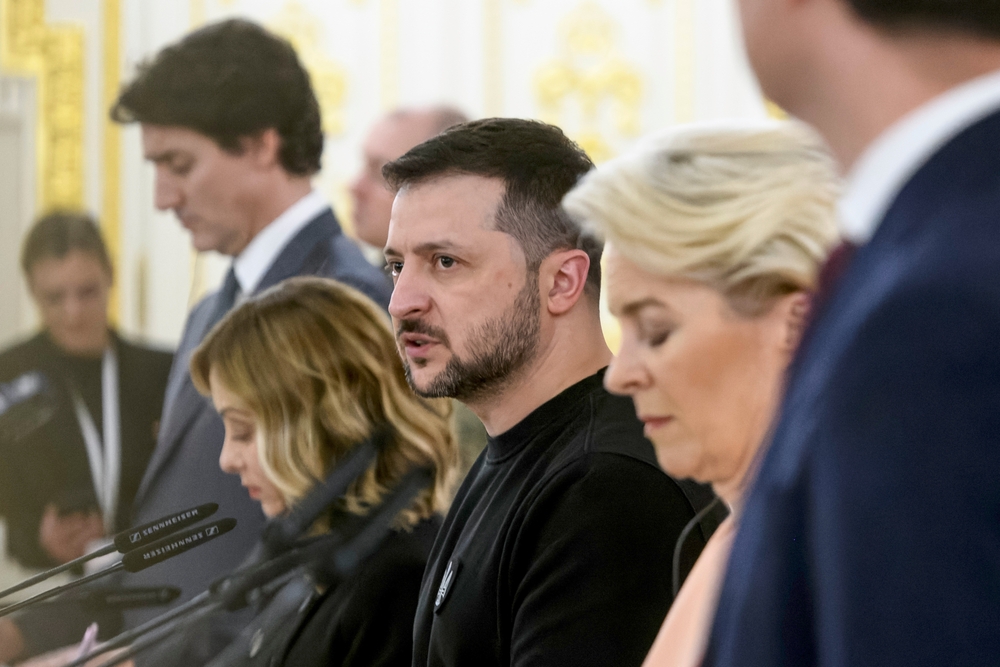The recent non-binding resolution passed by the European Parliament, supporting EU aid to Ukraine and controversially proposing the removal of restrictions on the use of weapons sent to Kyiv—allowing Ukrainian forces to target legitimate military objectives in Russia—has further exposed divisions within both Italy’s ruling coalition and the opposition. This issue has already been debated in Strasbourg, where a similar resolution was passed in July, although the vote was not made public at that time.
Government Divided Over Ukraine Support
Italy’s governing coalition remains split on Ukraine. While Fratelli d’Italia (Fdi) and Forza Italia (Fi) voted in favor of the overall resolution, they opposed paragraph 8, which calls for lifting the restrictions on weapons. The Lega party, however, voted against the entire resolution. Fdi and Fi representatives, including Carlo Fidanza, Pietro Fiocchi, and Nicola Procaccini, supported the resolution but rejected the specific paragraph. In contrast, members of Forza Italia, such as Caterina Chinnici and Salvatore De Meo, expressed differing views on the amendment.
Foreign Minister Antonio Tajani, leader of Forza Italia, reiterated his opposition to removing restrictions on the use of arms, arguing that “Italy is not at war with Russia.” The Lega, part of the European Conservatives and Reformists (ECR) group, voted against both the resolution and the amendment.
Opposition’s Disagreement
Within the opposition, the debate was equally contentious. While the majority of the Democratic Party (Pd) supported the resolution, many left-wing groups, including the Five Star Movement, the Greens, and Italian Left, voted against both the resolution and paragraph 8. Two prominent Pd members, Pina Picierno and Elisabetta Gualmini, publicly supported the resolution, while independent MPs Marco Tarquinio and Cecilia Strada abstained from voting on the overall text but opposed the contentious paragraph.
Several members of the European Parliament were absent due to travel, adding further complexity to the vote tally.
European Groups Show Divergence
Across Europe’s political groups, the response to the Ukraine resolution varied. The European People’s Party (EPP) largely voted in favor, with only a few abstentions. The left-wing European United Left-Nordic Green Left (GUE/NGL) and many members of the Identity and Democracy (ID) group opposed the resolution, highlighting a fractured stance within the Parliament. Groups like Renew Europe voted overwhelmingly in favor, while the Greens were divided, with several prominent Italian members, such as Ignazio Marino and Leoluca Orlando, voting against the resolution.
Venezuelan Elections Spark Further Controversy
In a separate resolution on Venezuela’s contested elections, the EPP cemented its central role in shaping EU policy. The resolution, recognizing Edmundo Gonzalez as the legitimately elected president, passed with 309 votes in favor from EPP, ECR, and the Identity and Sovereignty groups. Left-leaning parties, including S&D and the Greens, voted against, but they were outnumbered by a 201-vote majority. Renew Europe abstained, citing dissatisfaction with the Patrioti group’s co-sponsorship of the text.
EPP’s Dominance in the EU Parliament
The votes on Ukraine and Venezuela underscore the European People’s Party’s pivotal role in the EU Parliament, capable of forming alliances on key issues with either the center-right or center-left. This political maneuvering demonstrates the continued influence of traditional power brokers within Europe’s legislative body.

